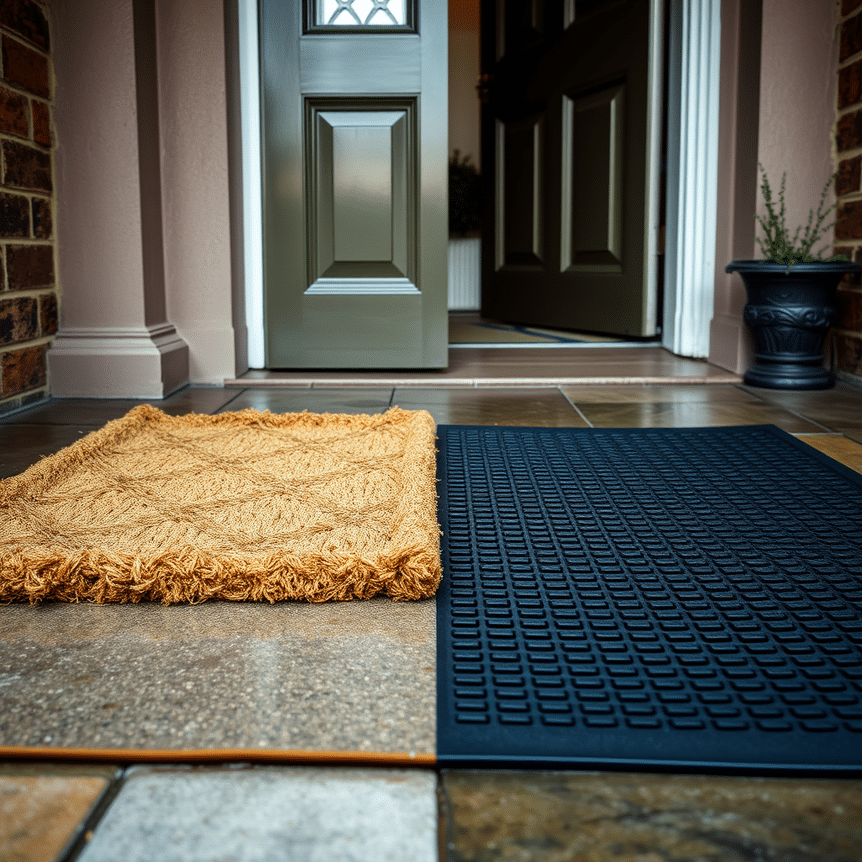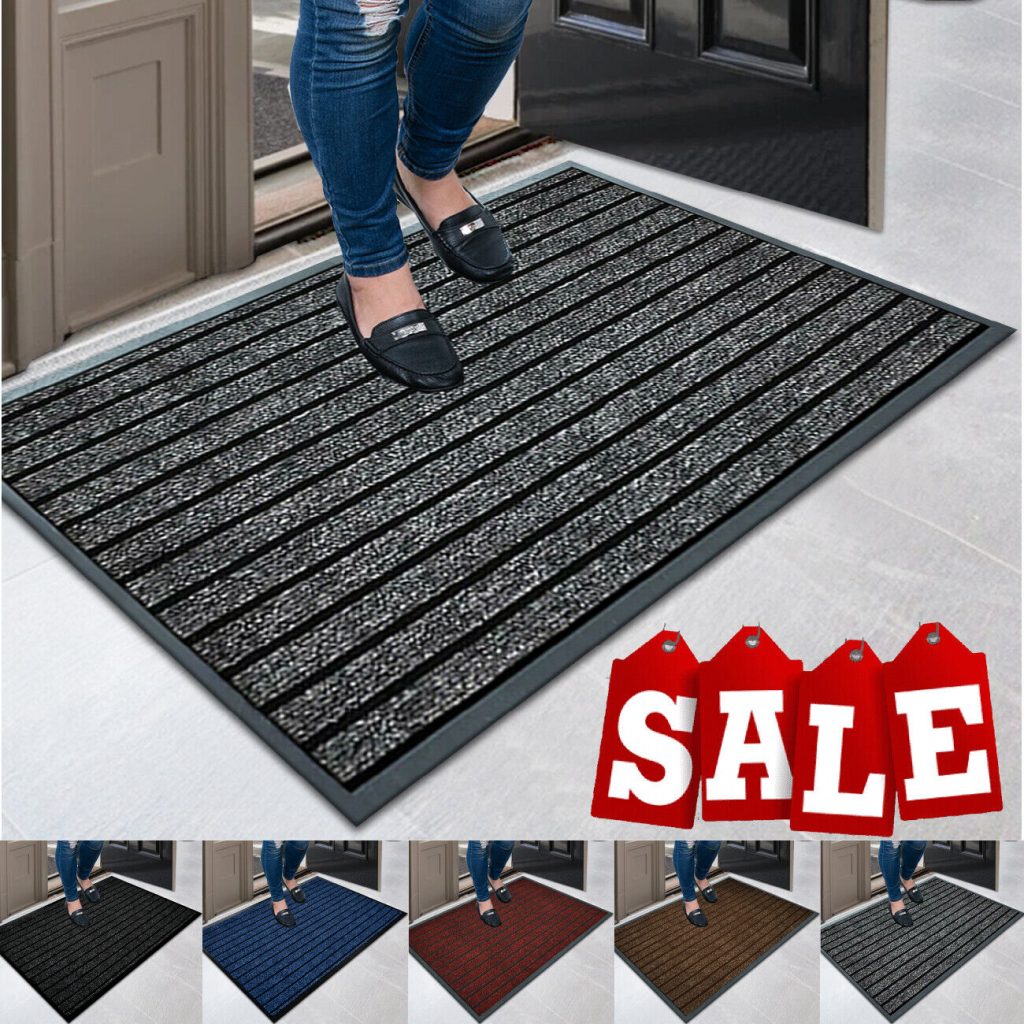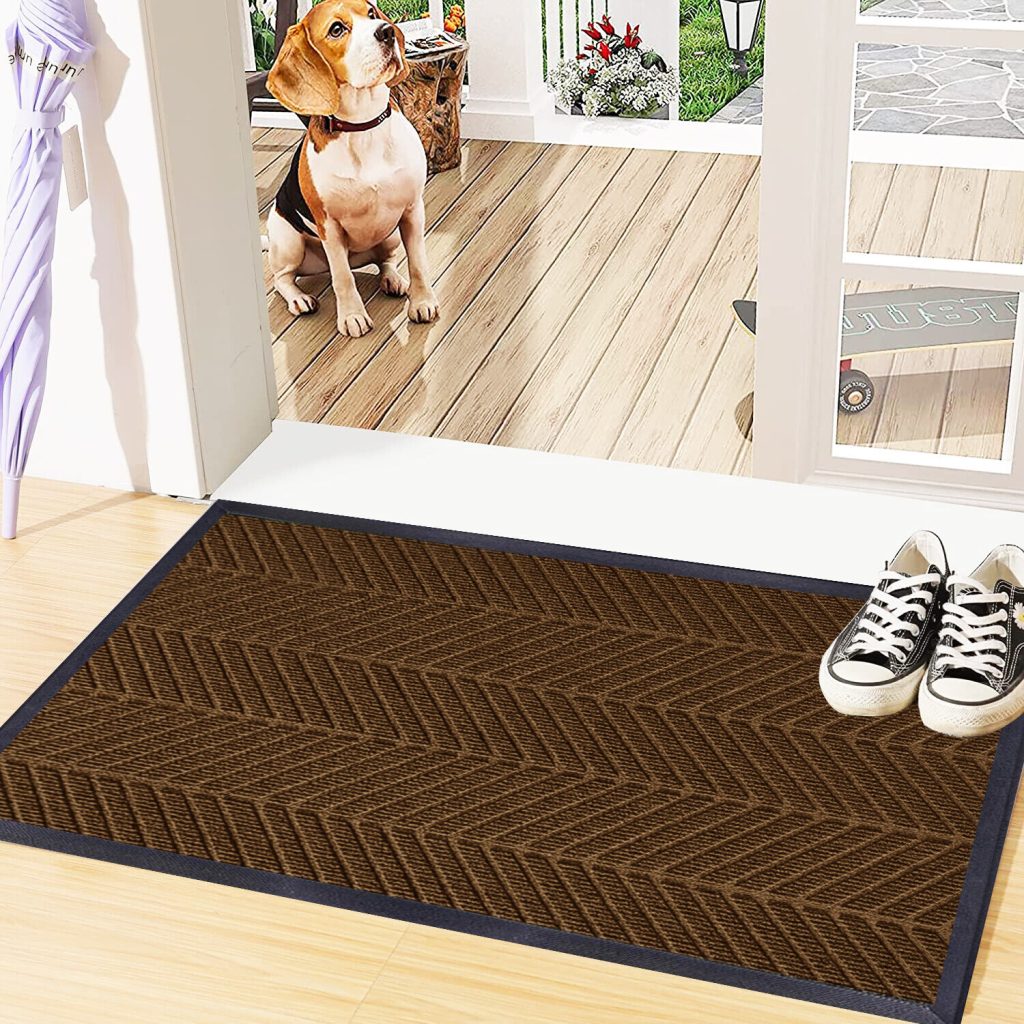Selecting the ideal door mat for your UK home is more than just an aesthetic choice—it directly impacts cleanliness, safety, and the longevity of your flooring. The UK’s variable weather, with frequent rain, mud, and occasional snow, demands a quality door mat that effectively traps dirt and moisture, preventing debris from entering your home. Beyond this vital functionality, the right mat must also withstand heavy foot traffic, offer reliable slip resistance for safety, and complement your home’s exterior style. Ultimately, the perfect balance of functionality, durability, and design makes choosing an appropriate entryway mat essential for your specific environment and lifestyle needs, ensuring optimal flooring protection for your property.
Getting to Know Coir and Rubber Door Mats: Material Insights
What Makes Coir Door Mats Ideal for Eco-Conscious, Covered Entrances
Coir mats are crafted from natural coconut fibres, making them an inherently biodegradable and excellent choice for eco-friendly homes. Their distinctive coarse texture naturally excels at scraping dirt, mud, and grit off shoes, playing a crucial role in maintaining indoor cleanliness. These natural fibre mats are best suited for use in covered or semi-protected entrances, such as porches or inside a front door, as they can handle moderate moisture. However, it’s important to note that coir mats can degrade or become mouldy if exposed to persistent dampness or direct heavy rain. Aesthetically, their warm, earthy look adds a rustic charm, blending seamlessly with traditional and natural home exteriors, making them popular welcome mats for those seeking an organic touch.
Why Rubber Door Mats Excel in Harsh Weather and High-Traffic Areas
In contrast, rubber door mats are celebrated for their exceptional durability and waterproof properties, specifically engineered to withstand intense wear from heavy footfall—even during the most severe UK weather conditions. Their inherent non-slip backing and surface patterns provide superior grip, ensuring safety on wet or slippery surfaces – a critical feature for any outdoor mat. These heavy-duty mats are remarkably low-maintenance; a simple hose down or wipe is often all that’s needed to keep them functional and looking good for years. Rubber mats serve exceptionally well in exposed entrances, garages, workshops, and even commercial settings due to their resilience and ability to trap dirt and control mud without becoming soggy, damaged, or posing a slip hazard.
Head-to-Head Benefits: Rubber vs Coir Door Mats Comparison Table
To help you make an informed decision, here’s a detailed comparison of the key features of coir and rubber door mats:
| Feature | Coir Door Mats | Rubber Door Mats |
|---|---|---|
| Eco-Friendliness | 100% natural, biodegradable | Often made from synthetic or recycled rubber, highly durable |
| Durability | Moderate; best for sheltered areas, can break down with constant moisture | High; excellent for all weather conditions and heavy use |
| Grip & Safety | Moderate; can become slippery when wet or worn | Excellent non-slip backing and superior surface grip |
| Maintenance | Requires regular shaking, occasional vacuuming, and drying | Easy to clean with water (hose down); very low upkeep |
| Moisture Resistance | Poor in continuous damp environments; absorbs water | Excellent water resistance; repels moisture effectively |
| Dirt Trapping | Coarse fibres effectively scrape dry dirt and mud | Patterns and textures trap mud, grit, and moisture efficiently |
| Aesthetic Style | Natural, rustic, warm tones; classic welcome mat feel | Modern, often utilitarian; available in various designs |
When to Choose Coir or Rubber: Tailored Use Cases for UK Homes
Opt for Coir If You Value Natural Aesthetics and Biodegradability
Choose coir door mats if your entrance is covered or indoors, and you prioritize a natural, eco-friendly look for your home. Coir’s robust, scraping fibres make it particularly effective at removing loose dirt and debris in low to medium-traffic areas. Its biodegradability is a significant advantage for those mindful of their environmental footprint, ensuring the mat won’t burden the environment at the end of its useful life. These mats are perfect for adding a traditional, welcoming touch to your entryway while performing essential dirt trapping.
Select Rubber for Heavy Foot Traffic, Slippery Surfaces, and Low-Maintenance Durability
Rubber mats are the unequivocally preferred option for front doors or any entrance exposed to the UK’s notoriously wet climate, high footfall, and surfaces prone to slipperiness. They provide excellent all-weather protection, offering a strong, reliable grip that significantly enhances safety. Their ability to easily handle mud and water without degradation makes them a superior choice for busy households where durability and ease of maintenance are paramount. For an outdoor mat that performs consistently in all conditions, rubber is hard to beat for its mud control and weather resistance.
Practical Tips & Expert Advice for UK Homes
Combining Rubber and Coir: The Best of Both Worlds with Rubber-Backed Coir Mats
For homes seeking a harmonious blend of natural style and enhanced durability, rubber-backed coir mats offer an ingenious solution. These hybrid designs harness the natural fibre cleaning power of coir while providing the essential slip resistance and longevity of a rubber backing. This makes them a highly versatile choice, well-suited for various UK climates, as the rubber backing not only reduces mat movement but also significantly prevents moisture from seeping through to your flooring, offering superior flooring protection.
Indoor vs Outdoor Placement: Maximizing Mat Performance
Strategic placement is key to maximizing your door mat’s performance and lifespan. Place traditional coir mats inside the home or under well-covered porches to shield them from direct rainfall and prolonged dampness, thereby extending their effectiveness and preventing premature degradation. Conversely, rubber mats are engineered to excel outdoors, performing robustly even on exposed patios, driveways, or garage entrances where they face the full brunt of the elements. Understanding these distinctions ensures optimal moisture control and cleanliness for your home.
How UK Weather Influences Your Door Mat Choice
The UK’s often unpredictable and frequently wet weather patterns are a primary determinant in your door mat selection. Areas experiencing frequent rain and significant mud require mats with superior water resistance and quick-drying properties—making rubber mats particularly advantageous for most UK locations. For drier periods or well-protected entrances, coir mats can still provide an eco-friendly and highly effective solution for scraping off dirt. Always consider the typical weather conditions your entryway experiences to make the most functional choice for your UK climate.
The Final Decision: Which Door Mat Fits Your Lifestyle?
When choosing between rubber and coir door mats, consider these key takeaways:
- Best for Eco-Minded, Low-Traffic Homes: Coir mats offer natural beauty and sustainability, ideal for interiors or well-sheltered entrances where moisture exposure is limited. They provide a classic welcome mat feel.
- Top Choice for All-Weather Resistance and Longevity: Heavy-duty rubber mats deliver unmatched durability, superior safety, and easy cleaning for busy, exposed entrances. They are the go-to for effective mud control and slip prevention.
- Hybrid Solutions for Versatile, Stylish Entrances: Rubber-backed coir mats combine the best of both materials—natural aesthetics with enhanced function, suitable for mixed-use environments where you need both dirt scraping and slip resistance.
For those seeking the ultimate in durability and all-weather protection, explore the range of robust and non-slip rubber mats, such as the Rugstars Non Slip Heavy Duty Rubber Mat—an excellent choice for keeping UK homes cleaner and safer, come rain or shine.
Frequently Asked Questions
Q1: Can I use a coir mat outside in the UK rain?
A1: Coir mats are best used in covered areas or indoors as they absorb moisture readily and can deteriorate, become mouldy, and lose effectiveness if left in constant damp or wet conditions.
Q2: Are rubber door mats environmentally friendly?
A2: While traditional rubber mats are typically synthetic, many modern rubber door mats are now made from recycled materials, making them a more sustainable choice. Their exceptional durability also reduces waste over time by lasting much longer than less robust options.
Q3: How do I clean rubber vs. coir mats?
A3: Rubber mats are very easy to clean; they can typically be rinsed with a hose, wiped clean with a damp cloth, or swept. Coir mats require regular shaking out to remove trapped dirt, occasional light vacuuming, and must be dried thoroughly to prevent mould and extend their lifespan. Here is an article on how to clean doormats.
Q4: Which type of mat provides better slip resistance?
A4: Rubber mats offer superior grip and stability due to their inherent material properties and often textured surfaces, making them ideal for slippery or wet surfaces commonly found in UK weather conditions.
Q5: Can I combine the benefits of rubber and coir mats?
A5: Yes, absolutely. Rubber-backed coir mats are a popular hybrid option that combine the natural, dirt-scraping qualities of coir with the non-slip, durable properties of a rubber backing, offering a versatile solution for many entrances.
Choosing between rubber and coir door mats for UK homes ultimately involves balancing eco-friendliness, weather resilience, maintenance requirements, and aesthetic style. Understanding your specific entryway environment and the demands of the UK climate will help you select the mat that will keep your home cleaner, safer, and more welcoming throughout the year.



